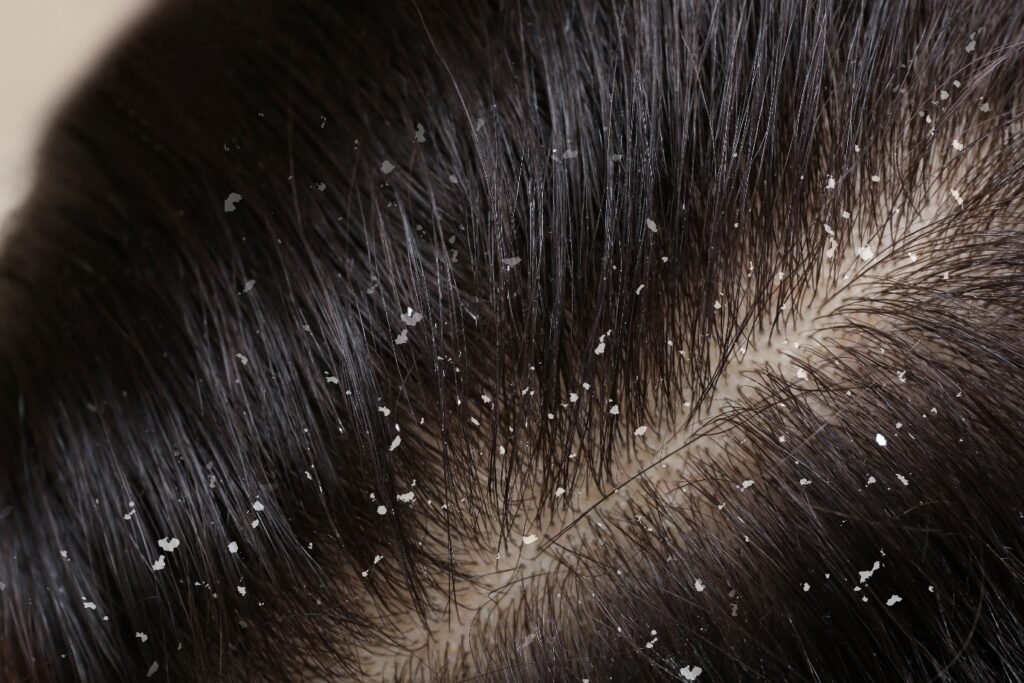
DANDRUFF
Dandruff is a white flake(dead skin cells) that appears over the scalp. It is not a diseased condition. It does not spread from one person to another person.
CAUSES
Any particular cause of dandruff is unclear, but research states that there are few factors involved in its cause involving certain genetic and environmental factors. It gets more vigorous during winters. Certainly, poor hygiene is not considered as the reason for its cause.
As we all are familiar with the fact that our body is in a continuous process of growth. So similarly in our skin also new layers are being developed continuously and these new lakers replace the old ones. The old cells are pushed out where they die and then fall off from the body. In most of the scenarios, these small skin flakes are not visible to the naked eyes. However, in some cases due to certain conditions, the cell turnover is unusually rapid, especially in the scalp. Which results in a high amount of shedding of dead skin cells which appear as white or greyish flakes on the scalps. Some most common other reasons for dandruff are Stress, HIV, Stroke, Parkinson’s disease, Epilepsy, etc
SIGNS AND SYMPTOMS Following are the signs and symptoms of dandruff:
â— Skin becomes flaky ranging from small and white to large, greasy and yellow.
â— There is itching in the skin along with a flaky appearance on the scalp, around the hairline, ears, nose or in the centre of the chest or back.
RISK FACTORS
There is a myth about dandruff that it may lead to serious health problems but it is not true. Although, it could be itchy, unsightly and embarrassing.
DIAGNOSIS
Diagnosis of dandruff is not that tricky. A dermatologist can usually diagnose dandruff by just looking at your scalp. In some cases when there is no result seen after the treatment then your doctor may go for a skin biopsy.
MANAGEMENT
Dandruff is often a chronic but treatable condition. It might return after some time so one needs to be careful regarding it.
Following are some ideas and options that can be helpful in dandruff management:
â— Normal Shampoo: To reduce oil and skin cell build-up wash hair daily with a mild shampoo, lightly massaging your scalp.
â— Medicated Shampoo: If normal shampoo is not helping try medicated shampoo. Use it 2-3 times a week.
â— Tea Tree Oil: It is considered a very effective remedy in dandruff removal.
â— Healthy Fats: Increasing the intake of healthy fats like Omega 3 fatty acids helps regulate oil production on the skin. Which helps in dandruff control.
There are some additional approaches as well for dandruff management. Some are listed below:
â— Get Some Sun: Small exposure to sunlight can help in reducing yeast formation on the scalp. But if you are using a Tar based dandruff treatment then avoid direct exposure to sunlight.
â— Cut Back On Hair Products: Hair gels, hair wax, sprays and many more such products can accumulate on your scalp resulting in increased oiliness and dandruff.
Homoeopathy medicine :
â— Badiaga: Badaga is a very good medicine for dandruff where the scalp is dry and scaly.
â— Thuja : Thuja can be given where flakes fall off everywhere. Hair is dry and brittle with severe itching of the scalp.
â— Kali sulph : it is well marked in dandruff and lasts for a long time . flakes are of yellowish colour with swelling and itching of the scalp.